Posted in: BBC, Disney+, Doctor Who, TV | Tagged: doctor who
Doctor Who S02 "Lucky Day": A Deep Dive Into The Trap RTD Set for Us
Let's do a deep dive into Doctor Who S02E04: "Lucky Day" and the trap Russell T. Davies set for us to lure us into a dark, bitter parable.
This week's episode of Doctor Who is really the one where everything changes, and a trap set by showrunner Russell T. Davies at his craftiest, slyest, and angriest. He lulls the viewer into a false sense of comfort (and perhaps boredom if they're weary of him playing his greatest hits like his own cover band) with assumption that this is going to be a light and fluffy Doctor-Lite episode as it follows Ruby Sunday (Millie Gibson) in her life on Earth after traveling with the Doctor. It initially looks like another "Love and Monsters" type story with echoes of The Sarah Jane Adventures, where a former companion has her own adventures fighting alien menaces. Then in the second half, Davies allows writer Pete McTighe to yank the carpet out from under the viewer by being about more than just Ruby, but a reflection of a real-world problem.
You've watched the episode, so we don't have to recap it, but discuss the most pertinent moments and themes with full spoilers.
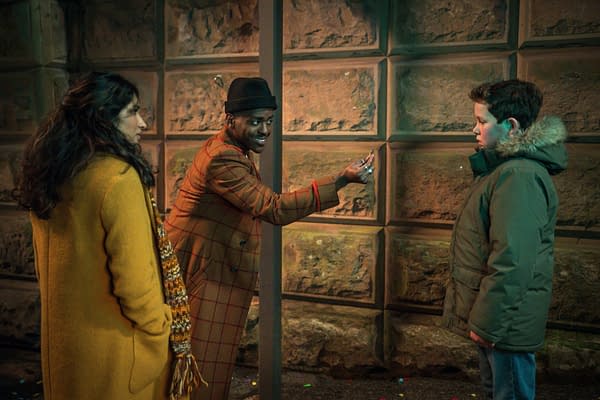
Everything's All Timey-Wimey
The Doctor (Ncuti Gatwa) and Belinda (Varada Sethu) still can't get back to May 24th, 2025, popping up almost anytime except that date. Here, it's New Year's Eve 2007, where they meet Conrad Clark as a child, which sets in motion a catastrophe that none of them could have anticipated. The Doctor is a background character in this episode but his presense is felt throughout since it's his presence and influence that caused everything to happen, including Davies' introduction of Chekov's Shreek, the monster that The Doctor and Ruby encounter in 2024 when a grown Conrad comes across them, shortly after they met The Beatles in the second episode of last season. This sets Conrad on the course to becoming a social media personality and finding Ruby to start dating her.
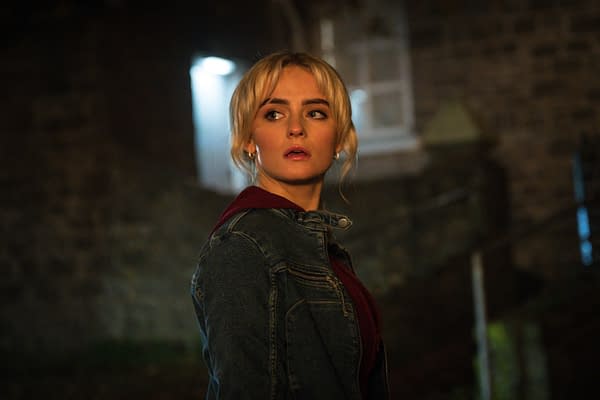
Ruby Joins the Ex-Companion in Recovery Club
Poor Ruby. She missed traveling with The Doctor and has PTSD from her adventures because not only did she get killed several times, she also witnessed the death of the entire universe, and seeing it restored doesn't make the former go away. She's now working for UNIT and is highly competent at dealing with emergencies, but she's still young and trusting and vulnerable to a scam artist who lovebombs and catfishes her. It's terrible to watch her get taken advantage of and betrayed by someone who's utterly malicious.

The Most Despicable Villain in the History of Doctor Who
It's very funny that Jason Hauer-King played along with the pre-release publicity talking about Conrad as the first half of the episode described, that the character is a Doctor Who geek like past characters have been, especially those written by Davies – Clive in the pilot episode of the 2005 revival, Elton and his mates in "Love and Monsters", UNIT Scientific Advisor Osgood (a character created by Steven Moffat). At first, he looks like a callback to those characters who were stand-ins for fans. Davies was expecting long-time viewers to either dig the vibe of another earnest Doctor geek or roll their eyes in exhaustion at that repeat of his greatest hits to set them up for the rug-pull and heel-turn. If Conrad is too good to be true as the awkward, sensitive boyfriend Ruby is drawn to, it's because his facade is as much a Trojan Horse as the first half of the episode is. There's always a twist at the end, and that end is Ruby's romance that turns out to be a trap to discredit UNIT in a reflection of real-world social media smear campaigns.
Conrad is the most evil villain in the history of Doctor Who because he's all too real. He seemed to start out as a fan, but his love has curdled into hate. He was initially enchanted by The Doctor but was beaten down for it by his mother, no less. He applied to join UNIT but Kate Stewart rejected him because she assessed, rightly, that he's untrustworthy and a wrong 'un. He's a hater, a troll, and a grifter who's turned his hatred into profit and power. The Daleks and various megalomaniacs in the series are camp, comfy comic book versions of evil and feel like safe fantasy versions of villainy. Conrad's heel-turn includes his appearing on real BBC talk shows to spread his campaign to smear UNIT and destabilise the world. Even fictional American news anchor Tiffany Wells (Lachele Carl), who appeared in the 2005 revival, returns to the series as a full-blown conspiracy nut. The presence of trolls, fake news, and bad actors first appeared in the 60th Anniversary Special "The Giggle," and this time feels like Davies expanding on that theme into the plot rather than a background detail.
Too many Conrad Clarks exist in real life, and Davies and McTighe know they're out there all over social media and the world, doing real damage to society. There's no sense of comfort at the end of the episode with the villain put away in a box, because Conrad is a representation of the worst real people in the world. Davies and McTighe's feelings about people like Conrad are clear, and his political anger at bad actors and agents of destruction is the same as in Davies' more adult political dramas like Years and Years and Torchwood: Children of Earth. That they co-wrote the upcoming spinoff, The War Between the Land and the Sea, is an encouraging sign.
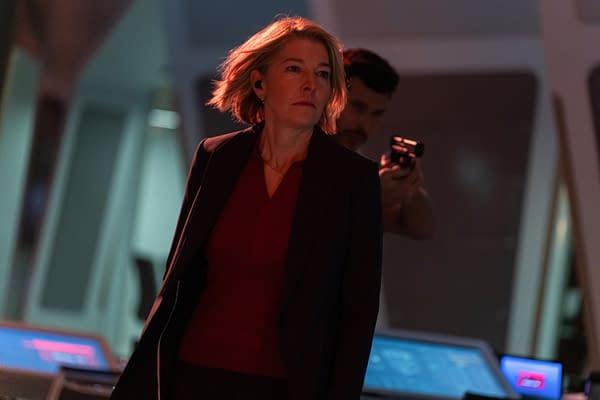
Kate Stewart has No Time for Mercy
Kate Stewart has always had a hardness about her and a willingness to pull the trigger or push the bullet to just kill an enemy. This is the first time we've seen that side of her for so long, at full blast and without remorse. Even her boyfriend, a trained combatant like Colonel Ibrahim, thinks she's crossing a line The difference is she owns it.
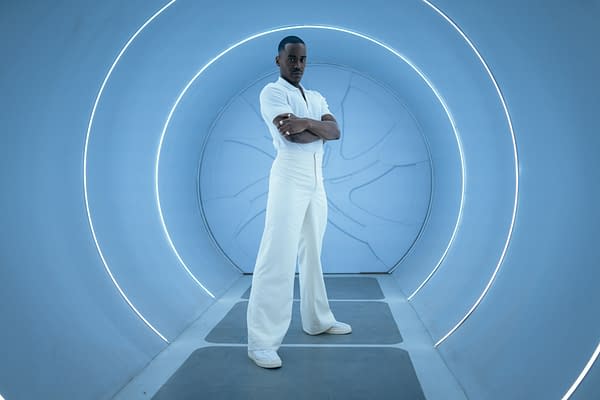
The Wrath of the Doctor
This is the first time we see the cold rage of The Doctor when he confronts Conrad. He doesn't offer Conrad a chance at redemption because he sees how irredeemable Conrad is. Rather than torture or kill him, the Doctor does the coldest, most cruel thing to him, which is to tell him what his deserved fate is and leave him to it. This Doctor hasn't met Belinda yet, and he seems to hear about Belinda for the first time here. Note that he's dressed all in white like an Angel of Wrath passing judgment.
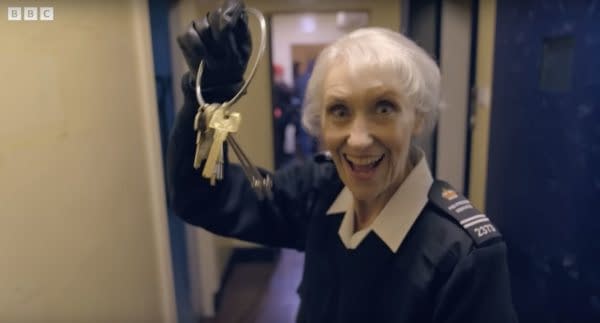
Mrs. Flood Watch
That would have been the end of Conrad if someone hadn't shown up to change his fate. It's clearer than ever this week that Mrs. Flood (Anita Dobson) is a villain. She shows up as a prison guard to set Conrad free from his cell and wreak more havoc. Is Conrad going to be responsible for destroying the Earth? And does that suit Mrs. Flood's plans? Is Mrs. Flood linearly moving through Time, or is she following The Doctor as he tries to return to May 24th, 2025? She seems to have the power to change the story that had been set.
The end of "Lucky Day" – for it is Conrad's lucky day that Mrs. Flood helps him escape – is infused with dread because of Conrad's villainy, which leaves a feeling of foreboding. "Lucky Day" is where the arc of the season comes into focus with nonlinear timey-wimey and a political edge.
Doctor Who: Lucky Day is streaming on Disney+ outside the UK.














